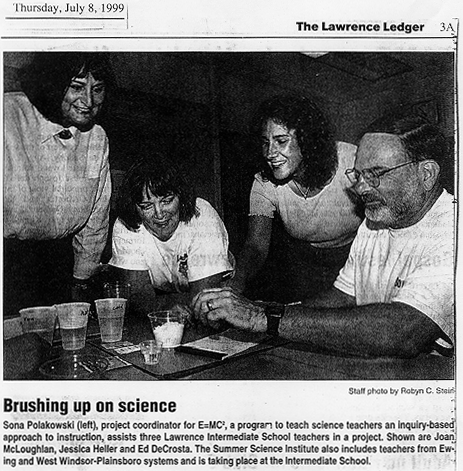
 |
|||
Newsclippings and Press ReleasesLawrence schools benefiting from strong college ties
by Laurel Goodell In Eileen Randall's class at Lawrence Intermediate School, a group of 4th grade students examine fossilized bones embedded in volcanic rock. In Monica Orloff's 3rd grade class at Ben Franklin Elementary School, students simulate an earthquake drill and assess their classroom and home environments for earthquake hazards. What each of these activities has in common is that it was led by a Princeton University student participating in the BRIDGES program. Princeton's BRIDGES program is just one of the many links between the Lawrence Township Public Schools and local colleges and universities. We are indeed fortunate to be located in an area with institutions of higher learning such as Princeton University, Rider University, the College of New Jersey, Rutgers University, and Mercer County Community College willing to share their resources with us. Lawrence schools actively take advantage of these programs, and the programs benefit both Lawrence students and Lawrence teachers. Teacher-training programs at Princeton, Rider, and CNJ have long sent their students into Lawrence classrooms to teach Lawrence students and to be mentored by experienced Lawrence teachers. Princeton's BRIDGES program also sends undergraduates into elementary and intermediate school classrooms like MRS. Randall's and Mrs. Orloff's, to teach science lessons based on the college-level material they are learning in their science courses. Reviewing the program, one teacher wrote "it was exciting for my students to see a young woman who is interested in science share her enthusiasm and knowledge." The interaction works both ways; at the same time local college and university students are coming to Lawrence classrooms, Lawrence students and teachers are going to the colleges and universities. Advanced Lawrence High School students have the opportunity to take college courses at Princeton, Rider, CNJ and Mercer County Community College. Over the last few years, for example, Lawrence High students have been enrolled in calculus and physics at Princeton University. Lawrence teachers also go back to the college classroom. Every year, many Lawrence teachers take college courses and work towards advanced degrees. District staff also participate in the Rutgers Literacy Curriculum Network, sponsored by the literacy faculty of Rutgers' Graduate School of Education. Ties with Princeton University are particularly strong in the area of science. In addition to the BRIDGES program described above, dozens of K-6th grade Lawrence teachers have participated in Project QUEST. Taught by Princeton faculty and staff in the summers, QUEST provides hands-on training in geology, biolgy, chemistry, physics, environmental science, weather and climate. Stop by on a typical QUEST day and you may find teachers wading in Stody Brook to measure stream discharge, looking at insects in compost piles, dissecting flowers from Prospect Garden, or wiring circuits in series and in parallel. having spent their summer engaged in hands-on methods of learning and doing science, teachers go on to use these techniques in their own classrooms. through the summer program and follow-up seminars throughout the year, teachers gain confidence in their knowledge of and ability to teach science, and benefit from networking with professional scientists and fellow teachers. Most teachers attend QUEST for more than one summer to participate in the various subject areas, and some, like Eileen Randall, Donna Lawrance and Christine Pancari become "lead teachers" in the program. In cooperation with the E=MC2 National Science Foundation grant to the Lawrence, Ewing, and West Windsor/Plainsboro school districts, Princeton faculty and staff also lead in-service workshops tied directly to the science curriculum materials used in district schools. According to Sona Polakowski, director of the E=MC2 grant, "the professional development provided by our university partners is a critically important element in developing and maintaining our quality science curriculum. Allteachers will make things work, but now they have the content background and quality materials to add 'meat' to the program." With programs such as these already in place, Lawrence should be well ahead of the game when new state requirements go into effect next year, requiring teachers to participate in 100 hours of professional development every five years. Additionally, our college and university ties help us strengthen our curriculum in the areas targeted by the New Jersey Core Curriculum Standards. We in Lawrence are well-placed to take advantage of the resources of the colleges and universities in our area. These programs help us nurture a rich educational environment that benefits Lawrence teachers and students alike. Laurel Goodell is a member of the Lawrence Township Board of Education.
Reprinted with permission from the Lawrence Ledger, 7/8/99.

|
|||||||||||||||||||||||||